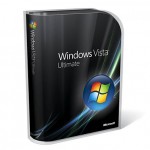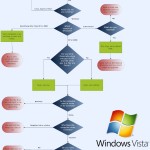New York Times thinks that Vista wins on looks, its more intelligent navigation and more powerful file-manipulation tools provide you with greater efficiency from Day 1. And while the more secure plumbing doesn’t guarantee a virus-free future, it will certainly make life more difficult for the sociopaths of the Internet. However, moving to Vista means hunting for updated drivers for your printer, audio card and so on, not to mention troubleshooting incompatible programs. It also means some relearning, thanks to features that Microsoft has moved, removed or rejiggered. But, it doesn’t matter what you (or tech reviewers) think of Windows Vista; sooner or later, it’s what most people will have on their PCs. In that light, it’s fortunate that Vista is better looking, better designed and better insulated against the annoyances of the Internet. At the very least, it’s well equipped to pull the world’s PCs along for the next five years — or whenever the next version of Windows drops down the chimney.
ComputerAct!ve (link dead) gives Windows Vista overall rating of 4 out of 5 and concludes that it’s far from revolutionary, Windows Vista is more like a better implemented version of Windows XP. The enhanced security is a key selling point, but upgraders could have a hefty bill on their hands.
USA Today says that as always, Microsoft is pouring on the hype. Beneath the superlatives, though, there are real improvements. Windows XP, the current operating system, is reliable and full-featured, but it has its problems. Vista improves many of those things, such as Vista’s Easy Transfer, Windows Connect Now, Desktop Search, centralized backup and restore center, and Windows DVD Maker.
CNet Asia (link dead) has a first look on Windows Vista RTM release and concludes that “overall, we find this Windows Vista RTM build very stable and feature-rich, and we look forward to reviewing the final release on January 30. Given the way the installation process checks for program updates, Microsoft has the opportunity to roll out the operating system with a few known bugs. So long as Microsoft is able to fix these bugs by its self-imposed general availability date, we think Vista could be a worthy upgrade for most PC users.”
PC Advisor conducts a definitive review on Windows Vista and concludes that the user experience and the revitalised appearance are significant advances, and most people will immediately take to the new OS. But is it good enough to justify an immediate upgrade? You can probably afford to wait until your current PC is on its last legs before buying a new PC. But if you want to keep up with the bleeding edge of technology, and make the most of the innovative applications that will make the most out of Vista’s advances, the temptation to upgrade sooner rather than later will be hard to resist.
Wall Street Journal (link dead) says that Windows Vista is the best version of Windows that Microsoft has produced. However, while navigation has been improved, Vista isn’t a breakthrough in ease of use. Overall, it works pretty much the same way as Windows XP. Windows hasn’t been given nearly as radical an overhaul as Microsoft just applied to its other big product, Office. Gradually, all Windows computers will be Vista computers, and that’s a good thing, if only for security reasons. But you may want to keep your older Windows XP box around awhile longer, until you can afford new hardware that can handle Vista.
Technology Review calls Windows Vista uninspiring with comment that “many of Vista’s “new” features seemed terribly familiar to me–as they will to any user of Apple’s OS X Tiger operating system. My efforts to get Media Center working highlighted two big problems with Vista. First, it’s a memory hog. Second, users choosing to install the 64-bit version of Vista on computers they already own will have a hard time finding drivers. Playing with OS X Tiger in order to make accurate comparisons for this review, I had a personal epiphany: Windows is complicated. Macs are simple.”
PC Magazine gives Windows Vista editor’s rating of 3.5 stars out of possible 5, and concludes that Vista is good—in some respects very good—but not spectacular. Call it a nice-to-have product rather than a must-have. If you’re buying a new consumer PC this spring, it probably makes sense to get Vista. If you’ve already got a PC running Windows XP smoothly, it’s harder to see a reason to upgrade right away. You can wait until you replace your machine, or at least a few months, until Vista’s kinks are worked out. For business customers, it makes sense to start evaluating Vista now, particularly since improved deployment, management, and security could lead to significant cost reductions in the long term. But you’ll want to be confident about compatibility and support before you make the transition en masse.
HamptonRoads (link dead) reviews Windows Vista and concludes that early all of the major, visible new features in Vista are already available in Apple’s operating system, called Mac OS X, which came out in 2001 and received its last major upgrade in 2005. And Apple is about to leap ahead again with a new version of OS X, called Leopard, due this spring. There are some big downsides to this new version of Windows. To get the full benefits of Vista, especially the new look and user interface, which is called Aero, you will need a hefty new computer, or a hefty one that you purchased fairly recently. Gradually, all Windows computers will be Vista computers, and that’s a good thing, if only for security reasons. But you may want to keep your older Windows XP box around awhile longer, until you can afford new hardware that can handle Vista.




